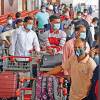Who will answer for our migrant workers’ deaths?

We are deeply concerned by the unnaturally high number of deaths of our migrant workers abroad, with the host country authorities failing to provide accurate explanations for them. According to the Wage Earners' Welfare Board (WEWB), 4,813 dead bodies of Bangladeshi migrants arrived in the country from the destination countries in 2024, mostly from the Gulf region. The number of deaths has steadily increased since 2021—with 3,818 in 2021, 3,904 in 2022, and 4,552 in 2023. Reportedly, WEWB received 56,769 dead bodies of migrants from 1993 to 2024, which is shocking. The question is, what is causing the deaths of so many of our workers? Have Bangladeshi authorities sought answers from the destination countries where these individuals met such dire fates?
Every year, many of our workers leave for foreign lands, hoping to improve their financial conditions. Unfortunately, many face severe hardships and return home in coffins, particularly from the Gulf region, the primary destination for Bangladeshi migrant workers. Often, the exact causes of their deaths remain unexplained, with "heart attack" commonly mentioned on their death certificates by the receiving countries. These countries rarely investigate the true reasons for these deaths, and Bangladeshi authorities also fail to find answers. Additionally, our female migrant workers often face physical, psychological, and sexual abuse at the hands of their employers—and many have reportedly died by suicide.
Over the years, our returnee migrant workers have shared the miserable conditions they faced in the Gulf states. Long hours, poor occupational health and safety practices, and exposure to cumulative health risks such as heat, air pollution, abusive conditions, psychosocial stress, hypertension, and chronic kidney disease have been common. The question is, have the Bangladeshi authorities made any effort to improve the living and working conditions of our workers? Additionally, our workers are under constant pressure to send money home to recoup the migration cost, leaving them with no opportunity for adequate rest. Have the authorities taken any steps to lower migration costs?
Why are we overlooking the struggles of our migrant workers, whose labour and remittances form the very backbone of our economy? We urge the authorities to prioritise the lives and welfare of our migrant workers above all else. While Bangladeshi missions abroad must advocate for the rights and welfare of migrant workers, the expatriates' welfare ministry and the foreign ministry should jointly establish a robust monitoring mechanism to ensure workplace safety, improved accommodation, and regular health check-ups for migrant workers. Additionally, they should collaborate with host countries to enforce proper labour laws and hold employers accountable for mistreatment, unsafe conditions, and deaths. The authorities must also demand transparency regarding the exact causes of our workers' deaths.


 For all latest news, follow The Daily Star's Google News channel.
For all latest news, follow The Daily Star's Google News channel. 








Comments